|
|
|
Sort Order |
|
|
|
Items / Page
|
|
|
|
|
|
|
| Srl | Item |
| 1 |
ID:
137241


|
|
|
|
|
| Summary/Abstract |
Who did it? Attribution is fundamental. Human lives and the security of the state may depend on ascribing agency to an agent. In the context of computer network intrusions, attribution is commonly seen as one of the most intractable technical problems, as either solvable or not solvable, and as dependent mainly on the available forensic evidence. But is it? Is this a productive understanding of attribution? — This article argues that attribution is what states make of it. To show how, we introduce the Q Model: designed to explain, guide, and improve the making of attribution. Matching an offender to an offence is an exercise in minimising uncertainty on three levels: tactically, attribution is an art as well as a science; operationally, attribution is a nuanced process not a black-and-white problem; and strategically, attribution is a function of what is at stake politically. Successful attribution requires a range of skills on all levels, careful management, time, leadership, stress-testing, prudent communication, and recognising limitations and challenges.
|
|
|
|
|
|
|
|
|
|
|
|
|
|
|
|
| 2 |
ID:
143021
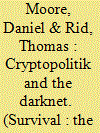

|
|
|
|
|
| Summary/Abstract |
Encryption policy is becoming a crucial test of the values of liberal democracy in the twenty-first century. The trigger is a dilemma: the power of ciphers protects citizens when they read, bank and shop online – and the power of ciphers protects foreign spies, terrorists and criminals when they pry, plot and steal. Encryption bears directly on today’s two top threats, militant extremism and computer-network breaches – yet it enables prosperity and privacy. Should the state limit and regulate the fast-growing use of cryptography? If so, how?
|
|
|
|
|
|
|
|
|
|
|
|
|
|
|
|
| 3 |
ID:
132291
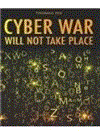

|
|
|
|
|
| Publication |
New Delhi, Pentagon Press, 2013.
|
| Description |
xvi, 218p.Hbk
|
| Standard Number |
9788182747562
|
|
|
|
|
|
|
|
|
|
|
|
Copies: C:1/I:0,R:0,Q:0
Circulation
| Accession# | Call# | Current Location | Status | Policy | Location |
| 057804 | 355.343/RID 057804 | Main | On Shelf | General | |
|
|
|
|
| 4 |
ID:
111149
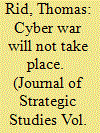

|
|
|
|
|
| Publication |
2012.
|
| Summary/Abstract |
For almost two decades, experts and defense establishments the world over have been predicting that cyber war is coming. But is it? This article argues in three steps that cyber war has never happened in the past, that cyber war does not take place in the present, and that it is unlikely that cyber war will occur in the future. It first outlines what would constitute cyber war: a potentially lethal, instrumental, and political act of force conducted through malicious code. The second part shows what cyber war is not, case-by-case. Not one single cyber offense on record constitutes an act of war on its own. The final part offers a more nuanced terminology to come to terms with cyber attacks. All politically motivated cyber attacks are merely sophisticated versions of three activities that are as old as warfare itself: sabotage, espionage, and subversion.
|
|
|
|
|
|
|
|
|
|
|
|
|
|
|
|
| 5 |
ID:
124652
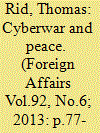

|
|
|
|
|
| Publication |
2013.
|
| Summary/Abstract |
Cyberwar Is Coming!" declared the title of a seminal 1993 article by the RAND Corporation analysts John Arquilla and David Ronfeldt, who argued that the nascent Internet would fundamentally transform warfare. The idea seemed fanciful at the time, and it took more than a decade for members of the U.S. national security establishment to catch on. But once they did, a chorus of voices resounded in the mass media, proclaiming the dawn of the era of cyberwar and warning of its terrifying potential. In February 2011, then CIA Director Leon Panetta warned Congress that "the next Pearl Harbor could very well be a cyberattack." And in late 2012, Mike McConnell, who had served as director of national intelligence under President George W. Bush, warned darkly that the United States could not "wait for the cyber equivalent of the collapse of the World Trade Centers."
|
|
|
|
|
|
|
|
|
|
|
|
|
|
|
|
| 6 |
ID:
114385
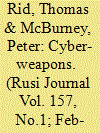

|
|
|
|
|
| Publication |
2012.
|
| Summary/Abstract |
What are cyber-weapons? Instruments of code-borne attack span a wide spectrum, from generic but low-potential tools to specific but high-potential weaponry. This distinction brings into relief a two-pronged hypothesis that stands in stark contrast to some of the received wisdom on cyber-security. Maximising the destructive potential of a cyber-weapon is likely to come with a double effect: it will significantly increase the resources, intelligence and time required for development and deployment - and more destructive potential is likely to decrease the number of targets, the risk of collateral damage and the political utility of cyber-weapons.
|
|
|
|
|
|
|
|
|
|
|
|
|
|
|
|
| 7 |
ID:
112453
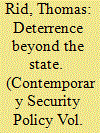

|
|
|
|
|
| Publication |
2012.
|
| Summary/Abstract |
Israel's experience with deterrence is unique: it is older, more diverse, and more experimental than that of any other state. How did Israel's strategy of deterrence evolve? How was it adapted to fit the non-state threat? And what is its utility? This article argues that Israel's experience with deterrence beyond the state can best be understood through the conceptual lenses provided by the other grand deterrence debate, that in the philosophy of law, not international relations. Israel's use of military force against non-state enemies does not fit the classic concepts of strategy. It is not just one act of force to compel one actor to fulfil one specific political goal at one given time; deterrence consists of a series of acts of force to create - and maintain - general norms of behaviour for many political actors over an extended period of time. Using force, consequently, does not represent a principal failure of deterrence but its maintenance through swift, certain, but measured responses. The inquiry concludes by identifying the method's limitations.
|
|
|
|
|
|
|
|
|
|
|
|
|
|
|
|
| 8 |
ID:
091299
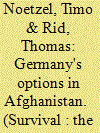

|
|
|
|
|
| Publication |
2009.
|
| Summary/Abstract |
Germany's military mission in Afghanistan has become increasingly politicised in the eight years since it was launched. Political and ideological differences between parties and even between ministries are becoming more pronounced, not less. This trend narrows the room for manoeuvre and limits the strategic debate. Greater instability in Kunduz province, at the heart of Germany's area of regional responsibility in Afghanistan, has two immediate effects: it both increases the need to act decisively and it heightens the risk of political paralysis in Berlin. This article argues that the latter is likely to prevail.
|
|
|
|
|
|
|
|
|
|
|
|
|
|
|
|
| 9 |
ID:
120292
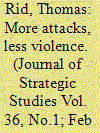

|
|
|
|
|
| Publication |
2013.
|
| Summary/Abstract |
A response to John Stone, Dale Peterson, and Gary McGraw on cyber war.
|
|
|
|
|
|
|
|
|
|
|
|
|
|
|
|
| 10 |
ID:
099706
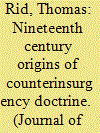

|
|
|
|
|
| Publication |
2010.
|
| Summary/Abstract |
In counterinsurgency, the population is the center of gravity. This insight has become a key doctrinal tenet of modern armed conflict. But where does it come from? The razzia, a tactic introduced by the French in North Africa around 1840, first thrust tribal populations into the focus of modern operational thinking. Soon the pioneering bureaux arabes added an administrative, civil, and political element. Eventually, in the 1890s, French operations in Madagascar gave rise to a mature counterinsurgency doctrine. David Galula, a French writer who heavily influenced the American Counterinsurgency manual, is merely the joint that connects the nineteenth century to the twenty-first.
|
|
|
|
|
|
|
|
|
|
|
|
|
|
|
|
| 11 |
ID:
135363
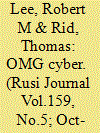

|
|
|
|
|
| Summary/Abstract |
For many austerity-hit Western countries, the defence budget has been a prime target for significant cuts. Nowhere has this been more apparent than in the United States. Yet one element of the Pentagon's budget continues to grow: cyber. High-profile security breaches at the corporate level and reports of cyber-espionage at the national level seemingly justify the vast sums involved in ensuring cyber-security. However, Robert M Lee and Thomas Rid argue that ‘cyber-angst’ is damaging – and self-serving. In this article, they list thirteen reasons why such cyber-security hype is counterproductive.
|
|
|
|
|
|
|
|
|
|
|
|
|
|
|
|
| 12 |
ID:
091272
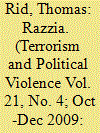

|
|
|
|
|
| Publication |
2009.
|
| Summary/Abstract |
The razzia, a tactic of swift and brutal raids used by the French military against recalcitrant tribes in Algeria in the 1840s, was a necessary step in modern military thought. At first glance the destructive and violent razzias stand in stark contrast to the constructive and non-violent bureaux arabes-an institutional ancestor of Provincial Reconstruction Teams. But both were developed in the same conflict and by the same men. These two innovations, this article argues, were also flipsides of the same coin: what today is called war "among the people." The razzia consequently appears as a necessary historic precursor for contemporary counterinsurgency doctrine.
|
|
|
|
|
|
|
|
|
|
|
|
|
|
|
|
| 13 |
ID:
110973
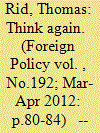

|
|
|
|
|
| Publication |
2012.
|
| Summary/Abstract |
No way. "Cyberwar is coming!" John Arquilla and David Ronfeldt predicted in a celebrated Rand paper back in 1993. Since then, it seems to have arrived -- at least by the account of the U.S. military establishment, which is busy competing over who should get what share of the fight. Cyberspace is "a domain in which the Air Force flies and fights," Air Force Secretary Michael Wynne claimed in 2006. By 2012, William J. Lynn III, the deputy defense secretary at the time, was writing that cyberwar is "just as critical to military operations as land, sea, air, and space." In January, the Defense Department vowed to equip the U.S. armed forces for "conducting a combined arms campaign across all domains -- land, air, maritime, space, and cyberspace." Meanwhile, growing piles of books and articles explore the threats of cyberwarfare, cyberterrorism, and how to survive them.
|
|
|
|
|
|
|
|
|
|
|
|
|
|
|
|
| 14 |
ID:
097413
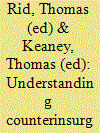

|
|
|
|
|
| Publication |
Oxon, Routledge, 2010.
|
| Description |
xii, 268p.
|
| Standard Number |
9780415777650
|
|
|
|
|
|
|
|
|
|
|
|
Copies: C:1/I:0,R:0,Q:0
Circulation
| Accession# | Call# | Current Location | Status | Policy | Location |
| 055042 | 355.0218/RID 055042 | Main | On Shelf | General | |
|
|
|
|
| 15 |
ID:
099723
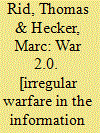

|
|
|
|
|
| Publication |
New Delhi, Pentagon Press, 2010.
|
| Description |
ix, 280p.
|
| Standard Number |
9780313364709
|
|
|
|
|
|
|
|
|
|
|
|
Copies: C:1/I:0,R:0,Q:0
Circulation
| Accession# | Call# | Current Location | Status | Policy | Location |
| 055371 | 355.0218/RID 055371 | Main | On Shelf | General | |
|
|
|
|
|
|
|
|
|